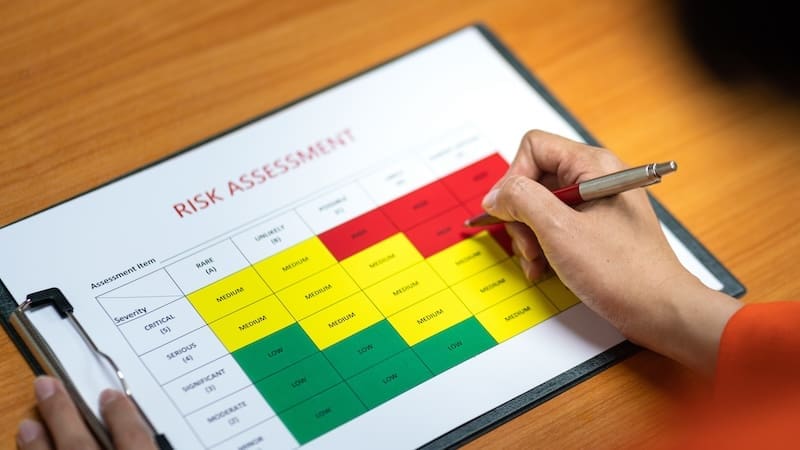Corporate reputation management is a crucial aspect of any business, especially in the digital age. With the rise of online platforms and social media, a company’s reputation can spread rapidly, positively or negatively, impacting its success and sustainability.
Understanding corporate reputation today is essential for businesses in order to navigate the challenges and opportunities it presents. Managing corporate reputation involves building and maintaining a strong brand identity, delivering high-quality products or services, engaging with customers and stakeholders, and adhering to transparent and ethical business practices.
The role of digital media cannot be underestimated in corporate communications and reputation management. An online presence and social media strategies are keys to shaping public perception. Monitoring and responding to online feedback is crucial, as is effectively managing online reputation crises when they arise.
To effectively manage corporate reputation, businesses must follow best practices, including developing a comprehensive reputation management strategy, investing in employee training and engagement, building strong relationships with key stakeholders, and measuring and evaluating reputation performance.
Looking ahead, the future of corporate reputation management will involve adapting to emerging trends and technologies, as well as meeting changing consumer expectations. By proactively managing corporate reputation in the digital age, businesses can safeguard their image and foster trust, leading to long-term success.
In this article, we’ll discuss effective reputation management strategies for corporate reputation management. If you want to talk to a brand reputation expert right away, call us at
844-230-3803
.
Understanding Corporate Reputation in the Digital Age

In the digital age, understanding the importance of corporate reputation is crucial for businesses to thrive. Online platforms have amplified the reach and impact of information, making it essential for companies to maintain a positive image.
Corporate reputation management utilizes several strategies to repair a tarnished reputation or manage a neutral or positive reputation:
- Nurturing a strong online presence through social media platforms and professional networks can enhance or create a good corporate reputation.
- It is important to monitor online conversations by using data analytics tools to gauge public sentiment accurately.
- Cultivating a transparent and ethical culture builds trust and credibility with stakeholders.
- Your response to negative feedback or crises should be swift, sincere, and empathetic to protect your brand reputation.
- Understanding the power of influencers and online communities can boost reputation.
- Incorporating user-generated content and testimonials can strengthen credibility.
- Embracing data protection and privacy practices is essential to maintaining a positive perception.
- Regularly reviewing and updating digital strategies based on feedback and analytics is crucial for sustaining a favorable corporate reputation.
Active engagement and proactive management are key in shaping a brand’s reputation. Overall, a cohesive and value-driven brand image across all digital channels is vital. And companies must adapt and evolve their strategies as the digital landscape constantly changes.
The Importance of Managing Corporate Reputation


The importance of managing corporate reputation cannot be overstated. Corporate reputation management is crucial for the success and profitability of a company.
In today’s highly informed and selective consumer market, a positive reputation plays a vital role in attracting customers, fostering brand loyalty, and driving sales. Conversely, a negative reputation can result in a loss of trust, customer attrition, and even legal complications.
To effectively manage corporate reputation, proactive measures must be taken. This entails delivering high-quality products or services, prioritizing customer satisfaction, and conducting business practices that are transparent and ethical.
Additionally, establishing a strong online presence and actively engaging with customers on social media platforms can significantly contribute to shaping a positive reputation. It is essential to actively monitor and promptly address any negative feedback or issues to minimize potential damage.
A valuable tip for effective corporate reputation management is to invest in employee training and development. Employees serve as brand ambassadors, and their actions and behaviors directly influence the company’s reputation. By fostering a positive and customer-centric culture within the organization, companies can enhance their reputation and establish a solid foundation for long-term success.
Managing corporate reputation is not only essential for business growth but also for ensuring sustainability. It requires continuous efforts to maintain a positive image and build trust with consumers. By placing reputation management at the forefront, companies can strengthen their position in the digital age and gain a competitive edge.
To speak with a corporate reputation management expert, call us today at
844-230-3803
.
Why is Corporate Reputation Important?


Corporate reputation is crucial in today’s digital age. A strong brand reputation not only attracts customers but also impacts the overall success of a business. A positive corporate reputation builds trust among stakeholders and enhances brand value.
One major reason why a good corporate reputation is important is that it establishes credibility. Companies with a good reputation are seen as reliable and trustworthy, which gives consumers confidence in their products or services. This translates into increased customer loyalty and repeat business.
Corporate reputation influences consumer perception and purchase decisions. In a competitive market, customers are more likely to choose a company with a positive reputation over its competitors. A majority of consumers consider reputation when making purchase choices.
A strong reputation helps companies attract and retain top talent, too. Job seekers are increasingly concerned about working for a company with a positive reputation. This enables businesses to attract skilled employees and maintain a competitive edge.
Corporate reputation also impacts financial performance. Companies with a good reputation tend to have higher stock prices and greater investor confidence.
Corporate reputation plays a vital role in today’s business landscape. It fosters credibility, influences consumer decisions, attracts top talent, and impacts financial performance. Therefore, businesses must prioritize managing and cultivating a positive reputation to thrive in the digital age.
How Does Corporate Reputation Impact Business Success?


Corporate reputation has a significant impact on business success. A positive reputation can attract customers, investors, and talented employees, ultimately leading to increased sales and growth. On the other hand, a negative reputation can result in lost business opportunities, declining sales, and even legal and financial repercussions.
A strong corporate reputation fosters trust and credibility among internal and external stakeholders. Customers are more likely to choose a company with a positive reputation, too, as they perceive it as being trustworthy and reliable. This translates into repeat business and customer loyalty, boosting sales, profitability and financial performance.
Investors also pay attention to a company’s reputation when making investment decisions. A good corporate reputation signals stability and competence, which can attract investment and partnerships. This access to capital allows businesses to fund growth initiatives, expand operations, and remain competitive in the market.
A positive reputation also enhances a company’s ability to attract and retain top talent. Job seekers are more likely to be attracted to companies with a good reputation, as they want to work for organizations with business operations that are respected and admired. This enables businesses to attract skilled and knowledgeable employees, which in turn enhances productivity and innovation.
As you can see, corporate reputation plays a crucial role in business success. A positive reputation drives customer loyalty, attracts investment, and helps in attracting and retaining talented employees. Therefore, companies should prioritize corporate reputation management to achieve long-term success in today’s digital age.
Building and Maintaining Corporate Reputation


The keys to corporate reputation management are building and maintaining a strong foundation.
This involves establishing a compelling brand identity that resonates with customers, ensuring the consistent delivery of high-quality products and services, engaging meaningfully with customers and stakeholders, and upholding principles of transparency and ethical business practices.
Let’s explore how these vital components come together to shape and safeguard a company’s reputation in today’s fast-paced digital landscape.
Establishing a Strong Brand Identity


Establishing a strong brand identity is of utmost importance in the current business landscape. It plays a crucial role in differentiating a company from its competitors and leaving a lasting impression on potential customers, making it an integral part of a corporate reputation management strategy.
To achieve a strong brand identity, companies must first define their core values, mission, and vision. These foundational elements are essential as they guide all aspects of the business and contribute to the establishment of a consistent brand identity.
Next, it is imperative for companies to develop a unique and recognizable visual identity. This includes creating a memorable logo, carefully selecting a color palette, and choosing appropriate typography. Consistently implementing this visual identity across all marketing materials and communication channels is essential in reinforcing brand recognition.
Another important aspect of corporate reputation management is to craft a compelling brand story that resonates with their target audience. This story should effectively communicate the company’s history, values, and unique selling propositions.
In addition, maintaining consistent messaging helps establish a strong brand identity. All forms of communication should convey the brand’s personality, tone, and key messages consistently.
Building strong relationships with customers is also crucial for a strong brand identity and corporate reputation management. This involves providing exceptional products or services, creating positive experiences, and engaging with customers through various touchpoints. These interactions shape the perception of the brand, establish trust, and foster customer loyalty.
Ultimately, establishing a strong brand identity positions companies as leaders in their industry. It enables them to attract and retain customers while also allowing them to stand out in a fiercely competitive marketplace.
Delivering Consistent and High-Quality Products and Services


Delivering consistent and high-quality products and services is essential for maintaining a positive corporate reputation. Customers have a strong desire for reliability and excellence from the brands they choose to engage with. Providing unwavering quality not only builds trust but also enhances the overall customer experience.
To achieve this, companies should prioritize the following steps:
- Implementing stringent quality control measures to ensure unwavering consistency and reliability across all products and services.
- Regularly evaluating and monitoring customer feedback to identify areas for improvement, and promptly addressing any issues.
- Investing in ongoing training and development programs for employees to maintain high levels of expertise and professionalism.
- Cultivating a culture of continuous improvement by regularly reviewing and updating processes and technologies to optimize the delivery of products and services.
- Prioritizing customer satisfaction by promptly resolving any complaints or issues and surpassing customer expectations.
Focusing on providing customers with high-quality products and services is a cornerstone of corporate reputation management. It directly relates to important outcomes for brands, including improved financial performance, highlighting trustworthy business operations, and promoting positive feedback via online review management.
Engaging with Customers and Stakeholders


Engaging with customers and stakeholders is crucial for building and maintaining a strong corporate reputation. Actively interacting with customers and stakeholders allows companies to better understand their needs and concerns, leading to improved products and services.
Companies can engage with customers and stakeholders through various channels, such as social media platforms, surveys, and community events. By actively listening to their feedback and addressing their concerns, companies can demonstrate their commitment to customer satisfaction and build trust.
Engagement with customers and stakeholders also fosters strong relationships and loyalty. Regular communication and updates about company initiatives and progress help to keep stakeholders informed and involved. This involvement creates a sense of ownership and connection, making them advocates for the company and its reputation.
Transparency and ethical business practices are also essential when engaging with customers and stakeholders. Being open about the company’s values, goals, and actions helps to establish trust and credibility. By demonstrating ethical behavior and responsible business practices, companies can cultivate positive corporate reputations and gain the support of customers and stakeholders.
Actively engaging with customers and stakeholders is essential for corporate reputation management. By listening to their feedback, addressing their concerns, and involving them in company initiatives, companies can build trust, loyalty, and a positive reputation.
Transparency and Ethical Business Practices


Transparency and ethical business practices are of utmost importance in today’s digital age for maintaining a strong corporate reputation. It is essential to take into account the following key considerations:
- Clear and open communication is the foundation of transparency. To build trust with customers and stakeholders, companies should provide clear and accurate information about their products, services, and business practices.
- Participating in ethical business practices involves complying with relevant laws and regulations. Companies should ensure that they adhere to legal requirements and showcase their commitment to operating ethically.
- To embrace ethical business practices, it is crucial for companies to focus on social and environmental responsibility. Corporate social responsibility can be demonstrated through initiatives such as fair trade sourcing, reducing its carbon footprint, and supporting local communities.
- Providing fair treatment to employees is a vital aspect of ethical business practices. Companies should establish a safe and inclusive work environment, offer fair wages, and provide opportunities for growth and development.
- Demonstrating transparency means taking accountability for actions and admitting mistakes. It is important for companies to show integrity and demonstrate their corporate social responsibility by rectifying errors promptly and proactively addressing concerns raised by customers and stakeholders.
To promote transparency and ethical business practices, companies should regularly assess their business processes, identify areas for improvement, and implement necessary changes.
Additionally, engaging with stakeholders and seeking feedback is crucial to ensure your brand aligns with their expectations. By prioritizing transparency and ethical practices, businesses can not only safeguard their corporate reputations but also foster long-term relationships with customers and stakeholders.
If you’re struggling to show the public that your business can be trusted, speak with an online reputation management expert today by calling
844-230-3803
.
The Role of Digital Media in Corporate Reputation Management


Today, the role of digital media in corporate reputation crisis management is more crucial than ever.
In this section, we’ll discuss the impacts of your brand’s online presence and social media strategies on your business reputation. We’ll also dive into the importance of monitoring and responding to online feedback, as well as how to effectively navigate and manage online reputation crises.
Let’s explore how digital media can either help or hinder corporate reputation management in this interconnected world.
Online Presence and Social Media Strategies


Online presence and social media strategies play a crucial role in corporate reputation management in the digital age. Companies must actively engage with their audience on social media platforms to build a positive online presence and maintain a strong reputation.
Here’s how social media can be used in a corporate reputation strategy:
- Establishing a Social Media Presence: Companies should create profiles on popular social media platforms such as Facebook, X, and Instagram. These platforms allow companies to interact with their audience, showcase their products or services, and share relevant content.
- Regularly Posting Engaging Content: Posting valuable and engaging content on social media helps to attract and retain followers. Companies should share informative articles, industry updates, customer testimonials, and behind-the-scenes content to engage and build trust with their audience.
- Responding to Customer Inquiries and Feedback: Social media platforms provide a direct line of communication between companies and their customers. It is essential to respond promptly and courteously to customer inquiries, complaints, and feedback. This demonstrates the company’s commitment to customer satisfaction and builds a positive image.
- Monitoring Online Conversations: Companies should actively monitor social media platforms for any mentions or discussions related to their brand. By staying aware of what customers are saying, companies can identify potential issues, instances of poor customer service, or negative feedback and address them promptly.
- Leveraging Influencers and Brand Ambassadors: Collaborating with influencers and brand ambassadors who align with your company’s values and target audience can significantly boost its online presence. These individuals can help promote your company’s products or services, reach a wider audience, and enhance your brand reputation.
By implementing effective online presence and social media strategies, companies can build a strong reputation, connect with their audience, and stay ahead in the digital landscape.
Monitoring and Responding to Online Feedback


Effectively monitoring and responding to online feedback is an essential part of a corporate reputation management strategy. Here are a few ways to manage online commentary:
- Monitor Online Platforms: Regularly track social media channels, review sites, and online forums to identify mentions and feedback related to your company.
- Respond Promptly: Address both positive and negative feedback in a timely manner.
- Show Empathy and Understanding: Respond empathetically to negative feedback, demonstrating that you value customer opinions and are genuinely interested in resolving issues promptly. This is especially important to handle complaints related to poor customer service.
- Provide Accurate Information: If there are misunderstandings or incorrect information, respond with accurate details to clarify and rectify any misconceptions that may arise.
- Encourage Positive Reviews: Request that satisfied customers leave positive reviews on platforms like Google or industry-specific review sites. This shows others that their issue was dealt with and they were happy with the outcome.
- Learn From Feedback: Analyze feedback patterns to identify areas of improvement and adjust your business strategies accordingly.
Since public perception is closely tied to how you engage with your audience, managing the online conversation about your brand is a necessary component of corporate reputation management.
Managing an Online Reputation Crisis


While you never want a PR crisis to arise, a necessary part of your corporate reputation strategy is having a plan in place in case one does.
In the event of a PR crisis, your corporate reputation strategy will include the following steps:
- Assess the Situation: Act quickly to evaluate the extent of the online reputation crisis and determine the potential impact on your brand’s reputation. Analyze the severity of the issue and the channels through which it is spreading.
- Respond Promptly: Once you have a clear understanding of the crisis, respond promptly to address concerns and provide accurate information. Take responsibility for any mistakes or shortcomings, and offer solutions or explanations to mitigate the damage.
- Remain Transparent: Communicate openly and honestly with your audience during a reputation crisis. Transparency will help you regain trust by showing that you are actively working to resolve the issue. Share updates and progress throughout the crisis to keep stakeholders informed.
- Engage With Your Audience: Monitor online conversations, including social media platforms and review websites, to identify and respond to comments, questions, and complaints during a PR crisis. Engaging with your audience shows that you value their feedback and are committed to resolving the crisis.
- Apologize: If the problems were wholly or partially caused by your company, offer a sincere apology. Acknowledge the impact and inconveniences caused, and assure your audience that you are taking steps to prevent similar issues in the future.
- Learn From the Experience: After resolving the crisis and starting to rebound with the help of your corporate reputation management strategy, conduct a thorough analysis to understand what went wrong and how to prevent it in the future. Use this knowledge to improve and strengthen your practices.
Managing an online reputation crisis requires swift action, transparent communication, and a commitment to resolving the issue at hand. By following these steps, you can effectively navigate through an online reputation crisis and safeguard your brand’s reputation.
For help adding crisis management to your corporate reputation management strategy, contact one of our ORM experts today at
844-230-3803
.
Best Practices for Effective Corporate Reputation Management


From developing a comprehensive reputation management strategy to investing in employee training and engagement, building strong relationships with key stakeholders, and measuring and evaluating reputation performance, there are many essential elements and best practices that contribute to a company’s success.
In this section, we will uncover the best practices that can elevate your corporate reputation to new heights.
Developing a Comprehensive Reputation Management Strategy


Developing a comprehensive reputation management strategy is crucial for businesses in the digital age. A proactive approach is needed to effectively manage and protect a company’s reputation.
Conducting a thorough assessment of the brand’s current reputation is essential to develop a comprehensive reputation management strategy. This includes monitoring online feedback, analyzing social media presence, and gathering customer insights. Quantitative metrics such as engagement rates and sentiment analysis can provide valuable data for evaluation.
Next, it is essential to identify potential risks and vulnerabilities that could impact the business’ reputation. This involves assessing any possible negative press, customer complaints, or ethical concerns. By identifying these risks, appropriate measures can be implemented to mitigate and address them promptly.
Building a strong brand identity is also a key component of developing a comprehensive reputation management strategy. This involves defining the company’s values, mission, and unique selling points. Consistent messaging and communication across channels help to establish brand authenticity and trustworthiness.
Engaging with customers and stakeholders is vital when developing a comprehensive reputation management strategy. This can be done through proactive communication, addressing customer concerns promptly, and seeking feedback to continuously improve products and services. Openness and transparency demonstrate a commitment to ethical business practices and corporate social responsibility, enhancing business reputation.
Developing a comprehensive online reputation management strategy should be an ongoing effort. Regular monitoring of a brand’s online presence, addressing feedback, and adapting to changing consumer expectations are essential for long-term success. By consistently cultivating a positive reputation, businesses can ensure they remain trustworthy and reputable in the digital age.
Investing in Employee Training and Engagement


Investing in employee training and engagement is of paramount importance for the success of a company. It plays a crucial role in enhancing employee skills and their overall performance.
There are several ways to approach employee training and engagement:
- Develop Comprehensive Training Programs: Implement tailored training programs that cater to the specific needs of employees. These programs should concentrate on the development of both technical and soft skills, including effective communication and problem-solving abilities.
- Provide Continuous Learning Opportunities: Employees should be encouraged to participate in workshops, seminars, and online courses that expand their knowledge and keep them updated with industry advancements. This not only bolsters their expertise but also boosts their confidence.
- Foster a Culture of Learning: Create an environment where continual learning is highly valued and encouraged. This can be achieved by establishing mentorship programs, organizing knowledge-sharing sessions, and providing resources for self-learning.
- Strengthen Employee Engagement: Engage employees by involving them in decision-making processes, recognizing their achievements, and offering growth and advancement opportunities. This approach increases employee satisfaction and loyalty toward the company.
- Measure and Evaluate Training Outcomes: Regularly assess the effectiveness of training programs by analyzing key performance indicators and gathering employee feedback. Identify areas of improvement and make adjustments as needed.
Promoting employee training and engagement is an investment in the future success of the company. By equipping employees with necessary skills and fostering their engagement, businesses can cultivate a high-performing workforce and create a positive working environment.
Building Strong Relationships with Key Stakeholders


Building strong relationships with key stakeholders is crucial for the success and reputation of a company. These stakeholders, including employees, customers, suppliers, investors, and the community, play a vital role in the overall success of a business.
To achieve this, there are several strategies that can be implemented:
- Engage with Stakeholders: Actively communicate and engage with stakeholders to thoroughly understand their needs and expectations. This can be accomplished through surveys, meetings, and other feedback mechanisms.
- Foster Trust and Transparency: It is essential to be honest and transparent in your interactions with stakeholders. This approach not only builds trust and credibility but also aids in strengthening relationships. Sharing information about the company’s performance, initiatives, and any challenges is crucial.
- Provide Value: Meeting the expectations of stakeholders and delivering high-quality products or services is a way to provide value. By consistently doing so, long-term relationships with satisfied stakeholders can be established.
- Collaborate and Involve Stakeholders: By involving stakeholders in decision-making processes and engaging them in the company’s activities, their sense of ownership and commitment can be enhanced. Advisory boards, partnerships, and participatory approaches are effective methods for achieving this.
- Address Concerns and Solve Problems: Promptly deal with any concerns or issues raised by stakeholders. Actively listen to their feedback and take appropriate actions to resolve problems.
- Contribute to the Community: Corporate social responsibility initiatives demonstrate the company’s care for the community. This can be done by supporting local charities, participating in environmental sustainability efforts, or encouraging volunteering activities.
By implementing these strategies and building strong relationships with key stakeholders, companies can enhance their reputation, gain support and loyalty, and create a positive impact on the overall success of the business.
Measuring and Evaluating Reputation Performance


Measuring and evaluating reputation performance gives businesses a realistic view of public perception and areas of improvement. Here are a few components to consider adding to your online reputation management strategy. By measuring and evaluating reputation performance using these strategies, businesses can gain a comprehensive understanding of how their reputation is perceived and take proactive steps to improve it.
- Surveys and Feedback: Conducting surveys and gathering feedback from customers, employees, and other stakeholders can provide valuable insights into the public perception of the company. These surveys can include queries about trust, satisfaction, and overall impressions.
- Media Monitoring: Monitoring media coverage, social media mentions, and online reviews can help gauge public sentiment and identify any emerging issues or negative perceptions that need to be addressed.
- Benchmarking Against Competitors: Comparing your reputation against competitors in the industry can provide a benchmark for evaluating performance. This can be done by analyzing public opinion surveys, media coverage, and customer reviews.
- Financial Performance: Assessing financial performance indicators such as revenue growth, profitability, and market share can indirectly reflect the impact of reputation on business success.
- Employee Satisfaction and Engagement: Employee satisfaction surveys can provide insight into the internal reputation of the organization. Satisfied and engaged employees are more likely to contribute positively to the company’s reputation.
Tools for measuring and evaluating brand reputation have evolved alongside advancements in communication and information technologies. Companies now have access to vast amounts of data and feedback from various sources. This allows for more comprehensive tracking of reputation metrics and real-time insights into public perception.
As technology continues to advance, reputation management is expected to become even more data-driven and sophisticated, enabling companies to proactively address reputation issues and enhance their overall standing in the digital age.
The Future of Corporate Reputation Management


As businesses navigate the ever-evolving digital landscape, the future of corporate reputation management becomes paramount.
In this section, we’ll plunge into the exciting realm of emerging trends and technologies that are revolutionizing how companies shape and protect their image. We also delve into the crucial aspect of adapting to changing consumer expectations, as maintaining a positive reputation has never been more essential.
Emerging Trends and Technologies


Emerging trends and technologies shape the future of corporate reputation management. It is crucial for businesses to stay ahead of the following developments to maintain a positive image in the digital age:
Artificial intelligence (AI) has revolutionized reputation management by enabling companies to analyze vast amounts of data and identify trends and patterns. It assists in monitoring online conversations, conducting sentiment analysis, and identifying potential reputation risks.
Blockchain technology offers transparency and immutability, making it useful for verifying claims, tracking supply chains, and ensuring ethical business practices. This technology can enhance trust and reputation among customers and stakeholders.
Augmented reality (AR) can be utilized to provide immersive experiences for customers, enabling them to interact with products or services in real-time. This technology can improve brand perception and create a positive impression.
Social listening tools are advanced tools that allow businesses to monitor online conversations, identify trends, and respond promptly to customer feedback. These tools aid in managing reputation in real-time and addressing concerns or issues.
Data privacy and security are of the utmost importance due to increasing concerns about data privacy. Businesses must prioritize protecting customer information by implementing robust security measures and complying with privacy regulations.
To adapt to these emerging trends and technologies, businesses should invest in research and development, collaborate with technology partners, and continuously update their reputation management strategies. By embracing these advancements, businesses can effectively manage their corporate reputation in the digital age and maintain a positive image among customers and stakeholders.
Adapting to Changing Consumer Expectations
How can your company adapt to changing consumer expectations? The following tips will help you keep up with what your audience wants and needs moving forward:
- Flexible Product Offerings: Businesses need to be flexible in their product offerings to meet changing consumer demands. This may involve developing new products or modifying existing ones to better align with consumer expectations.
- Personalized Experiences: Consumers now expect more personalized experiences from brands. This could include tailored marketing messages, customized products or services, and personalized customer support.
- Omnichannel Presence: With the rise of digitalization, consumers expect businesses to have a strong online presence and provide seamless experiences across multiple channels, both online and offline.
- Transparency and Authenticity: Consumers value transparency and authenticity from brands. They want businesses to be open and honest in their communications and to demonstrate genuine care for their customers and the wider community.
- Social and Environmental Responsibility: Consumers are increasingly concerned about social and environmental issues. Businesses that demonstrate a commitment to sustainability and corporate social responsibility are more likely to gain the trust and loyalty of consumers.
- Continuous Improvement: To meet evolving consumer expectations, businesses need to continuously monitor and evaluate customer feedback and market trends. This will enable them to identify areas for improvement and make necessary adjustments to their products, services, and operations.
Successful brands prioritize their customers’ needs and make sure to keep up with a changing market to continually deliver exceptional experiences.
Speak With an Online Reputation Management Expert Today
It can take in-depth expertise to ensure your company has a good corporate reputation management strategy. With something as important as your corporate reputation, which directly affects a business’ financial performance, you don’t want to cut corners.
To speak with an ORM expert today about your business’ unique needs, call us at
844-230-3803
.













